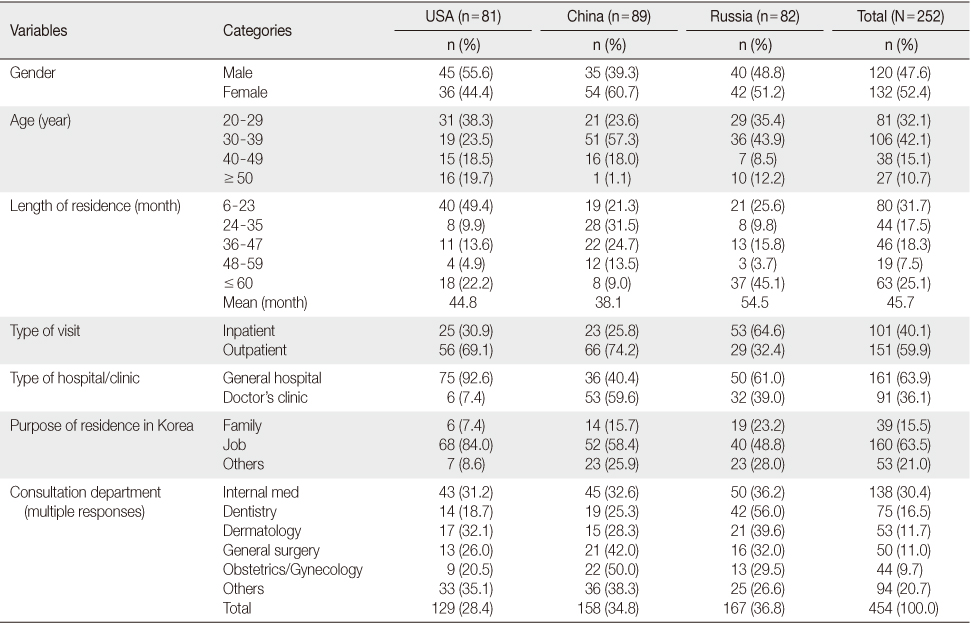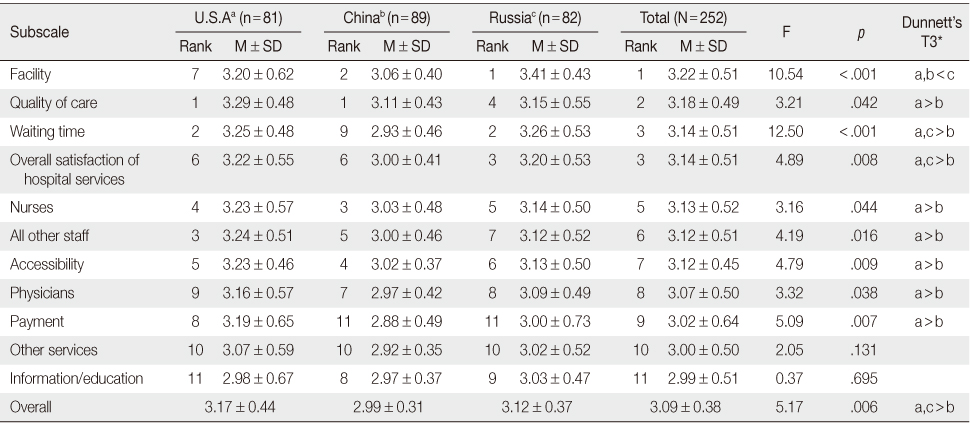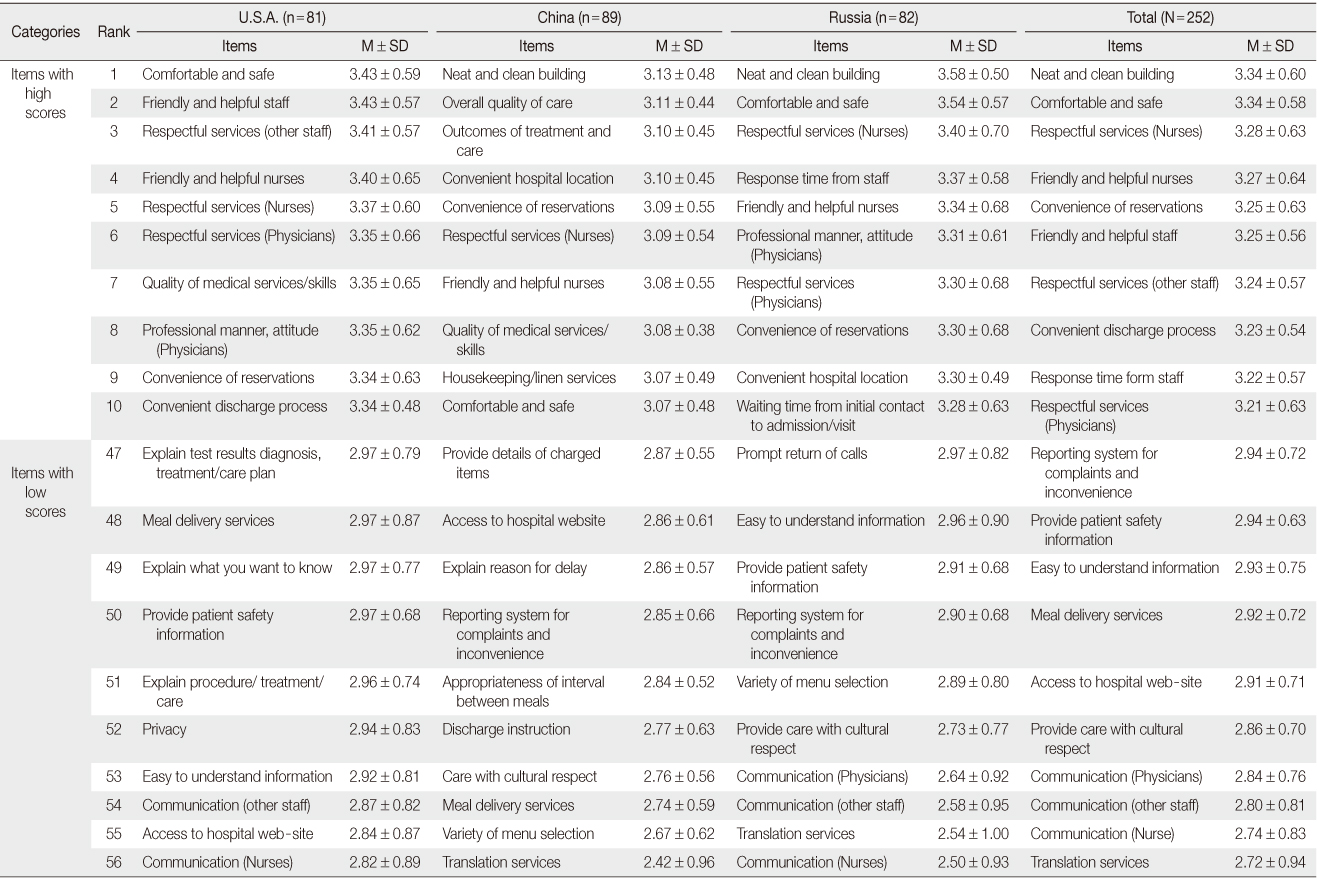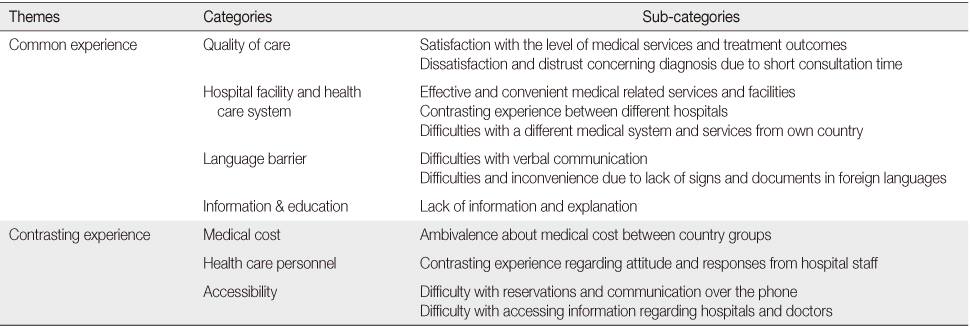Articles
- Page Path
- HOME > J Korean Acad Nurs > Volume 44(1); 2014 > Article
-
Original Article
- A Comparison Study using Mixed Methods on Foreign Residents' Satisfaction with Korean Health Care Services
- Keum Soon Kim, Jung Won Ahn, Jin A Kim, Hee Jung Kim
-
Journal of Korean Academy of Nursing 2014;44(1):86-96.
DOI: https://doi.org/10.4040/jkan.2014.44.1.86
Published online: February 28, 2014
1College of Nursing, The Research Institute of Nursing Science, Seoul National University, Seoul, Korea.
2College of Nursing, Seoul National University, Seoul, Korea.
3Korea Health Industry Development Institute, Cheongwon, Korea.
- Address reprint requests to: Ahn, Jung Won. College of Nursing, Seoul National University, 103 Daehak-ro, Jongno-gu, Seoul 110-799, Korea. Tel: +82-2-740-8458, Fax: +82-2-747-3948, kylieahn@naver.com
© 2014 Korean Society of Nursing Science
This is an Open Access article distributed under the terms of the Creative Commons Attribution NoDerivs License. (http://creativecommons.org/licenses/by-nd/4.0/) If the original work is properly cited and retained without any modification or reproduction, it can be used and re-distributed in any format and medium.
Abstract
-
Purpose
- This study was conducted to examine and compare satisfaction with Korean health care services for Americans, Chinese and Russians who resided in Korea.
-
Methods
- A questionnaire was distributed to 252 participants (81 Americans, 89 Chinese, 82 Russians). Three focus group interviews were subsequently conducted in order to obtain a greater understanding of participants' experience and perspectives.
-
Results
- The average satisfaction score was 3.09, with Americans and Russians showing significantly higher scores than Chinese. Overall, participants reported higher satisfaction in 'Facility', 'Quality of care' and 'Nursing services' as opposed to 'Information/education'. 'Care with cultural respect' as well as communication related services. Data from the focus group interviews were categorized into 12 sub-categories, 7 categories and 2 themes. The two themes were common experience and contrasting experience. Common experience included 4 categories, 'Quality of care', 'Hospital facility and health care system', 'Language barrier' and 'Information and education'. Contrasting experience included 3 categories, 'Medical cost', 'Health care personnel' and 'Accessibility'.
-
Conclusion
- Results of this study provide basic knowledge on foreign residents' satisfaction and experience with Korean health care services. Further research is needed with foreigners from different cultural backgrounds. Administrative and educational efforts are required to improve communication skills and cultural competency.
This study was funded by Ministry of health and welfare for 'Global healthcare for international patients' project in 2011.
- 1. Korea Immigration Service, Ministry of Justice. 2011 Korea immigration service statistics. Gwacheon: Ministry of Justice; 2012.Report No.: 11-1270000-000465-10.
- 2. Korea Health Industry Development Institute. Statistics on international patients in Korea, 2011 [Internet]. Cheongwon, Korea Health Industry Development Institute. 2012;cited 2013 November 11. Available from: http://www.khiss.go.kr/board/bbs_read.jsp?tname=MINBOARD358&bbsid=B301&cat_bbsid=&bbs_seq=355&jkey=&jword=&pg=4&htxt_code=12536978062659050219061516896964&wj_vcs=&reverseNum=101
- 3. Lassetter JH, Callister LC. The impact of migration on the health of voluntary migrants in western societies. J Transcult Nurs. 2009;20(1):93–104. http://dx.doi.org/10.1177/1043659608325841ArticlePubMedPDF
- 4. Hwang J, Park HA. Patient satisfaction as an outcome indicator. J Korean Acad Adult Nurs. 2001;13(1):29–39.
- 5. Lee S, Kim JI, Cho W, Lee J. A Study on the patient satisfaction survey at the general hospitals in Korea. J Korean Soc Qual Assur Health Care. 1998;5(1):42–57.
- 6. Lee S, Cho WH, Choi KS, Kang M. Comparative analysis of models for measuring consumer satisfaction in health care organization. Korean J Prev Med. 2001;34(1):55–60.
- 7. Kim MR, Rhee KC. Development of consumer satisfaction scale for outpatients' medical services. J Consum Stud. 2003;14(2):197–214.
- 8. Kim MS, Park HY. An empirical study on service quality and patient satisfaction in specialty and general hospitals. Korean J Hosp Manage. 2006;11(1):31–53.
- 9. Kim BG, Yang JH, Chang DM. A study on the medical services satisfaction of cancer patients in Busan area. J Korea Acad-Ind Coop Soc. 2012;13(1):236–246.Article
- 10. In S. The effect of customer value in regards to medical tourism products on customer satisfaction and loyalty: Moderating effects of switching switching barriers [dissertation]. Gangneung, Kwan-Dong University. 2012.
- 11. Kim J. Survey of services provided by non-governmental organizations for foreign workers. Korean Public Health Res. 2004;30(1):24–35.
- 12. Koh CK, Koh SK. Married female migrants' experiences of health care services. J Korean Acad Soc Nurs Educ. 2009;15(1):89–99.Article
- 13. Lee BS, Oh IK, Lee EM. Foreign residents' experience of Korean health care services. J Korean Acad Nurs Adm. 2011;17(2):226–237. http://dx.doi.org/10.11111/jkana.2011.17.2.226Article
- 14. Ware JE, Snyder MK, Wright WR. Development and validation of scales to measure patient satisfaction with medical care services Vol I Part B: Results regarding scales constructed from the patient satisfaction questionnaire and measures of other health care perceptions. Springfield, VA: National Technical Information Service; 1976.Report No.: NTIS Publication No. PB 288-300.
- 15. Parasuraman A, Berry LL, Zeithaml VA. SERVQUAL: A multiple-item scale for measuring consumer perception of service quality. J Retailing. 1988;64(1):12–40.
- 16. Aharony L, Strasser S. Patient satisfaction: What we know about and what we still need to explore. Med Care Rev. 1993;50(1):49–79.ArticlePubMedPDF
- 17. Cohen J. Statistical power analysis for the behavioral sciences. 2nd ed. Hillsdale NJ: Lawrence Erlbaum Associates; 1988.
- 18. Department of International Cooperation, Korea Health Industry Development Institute. Care manual for international patients. Cheongwon: Korea Health Industry Development Institute; 2010.
- 19. Graneheim UH, Lundman B. Qualitative content analysis in nursing research: Concepts, procedures and measures to achieve trustworthiness. Nurse Educ Today. 2004;24(2):105–112. http://dx.doi.org/10.1016/j.nedt.2003.10.001ArticlePubMed
- 20. Wold Health Organization. Resolution WHA 61.17: Health of migrants. In: The Sixty-first World Health Assembly; 2008 May 19-24; Geneva: Switzerland.
- 21. Andrulis DP, Brach C. Integrating literacy, culture, and language to improve health care quality for diverse populations. Am J Health Behav. 2007;31:Suppl 1. S122–S133. http://dx.doi.org/10.5555/ajhb.2007.31.supp.S122ArticlePubMedPMC
- 22. Kim Y. Diversification in Korea and cultural competence in social welfare. Korean J Soc Welf Stud. 2007;35:117–144.
- 23. Hwang JI. Factors influencing consultation time and waiting time of ambulatory patients in a tertiary teaching hospital. J Korean Soc Qual Assur Health Care. 2006;12(1):6–16.
- 24. Wilson A, Childs S. The relationship between consultation length, process and outcomes in general practice: A systematic review. Br J Gen Pract. 2002;52(485):1012–1020.PubMedPMC
- 25. Kim DS, Kim D, Jung TY. Cognition of Korean college students for six foreigner groups. Korean J Soc Psychol. 2011;25(1):1–23.Article
- 26. Lim DK, Kim CS. A study on Korean college students' perception of multi-cultural society and its antecedent factors: Focusing on social distance, image of foreign residents, and qualifications for being a Korean. Korean J Commun Stud. 2011;19(1):5–34.
REFERENCES
Figure & Data
REFERENCES
Citations

- How Do We Approach Quality Care for Patients from Middle Eastern Countries? A Phenomenological Study of Korean Nurses’ Experiences
Dael Jang, Seonhwa Choi, Gahui Hwang, Sanghee Kim
Journal of Korean Academy of Nursing.2024; 54(3): 372. CrossRef - An Exploratory Quantitative Study of Factors Associated with Dissatisfaction with Japanese Healthcare among Highly Skilled Foreign Professionals Living in Japan
Tomoari Mori, Yoko Deasy, Katsumi Mori, Eisuke Nakazawa, Akira Akabayashi
BioMed.2022; 2(4): 431. CrossRef - Public Health Center Service Experiences and Needs among Immigrant Women in South Korea
Duckhee Chae, Hyunlye Kim, Minjeong Seo, Keiko Asami, Ardith Doorenbos
Journal of Korean Academy of Community Health Nursing.2022; 33(4): 385. CrossRef - A Survey of Nurses' Need for Care Robots in Children's Hospitals
Meiling Jin, Jeongeun Kim
CIN: Computers, Informatics, Nursing.2020; 38(7): 349. CrossRef - Perceived cultural differences in healthcare for foreign patients visiting South Korea: tool development and measurement
Sumi Sung, Hyeoun-Ae Park
BMC Health Services Research.2019;[Epub] CrossRef - The Effects of Korean Medical Service Quality and Satisfaction on Revisit Intention of the United Arab Emirates Government Sponsored Patients
Seoyoung Lee, Eun-Kyung Kim
Asian Nursing Research.2017; 11(2): 142. CrossRef - Structural Equation Modeling of Cultural Competence of Nurses Caring for Foreign Patients
Jung-Won Ahn
Asian Nursing Research.2017; 11(1): 65. CrossRef - Effects on Critical Thinking Disposition and Empathy on Cultural Competency in Nursing Students
Eun Ju Song, Ya Ki Yang, Sook Kyoung Park
Journal of Korean Academy of Psychiatric and Mental Health Nursing.2016; 25(4): 347. CrossRef - Caring Experiences of the Nurses Caring for Foreign Inpatients of non-English Speaking
Hye-Young Jang, Eun Lee
Journal of the Korea Academia-Industrial cooperation Society.2016; 17(12): 415. CrossRef - The Impacts of Socio-Economic Characteristics on the Services User's Perception by the Change of Social Condition in Healthcare Services
Young Soon Choi
Journal of the Korea Academia-Industrial cooperation Society.2015; 16(5): 3276. CrossRef - Factors on Healthcare Utilization by Asian Immigrants in the United States
Aeyoung So, Jennie C. De Gagne, Jina Oh
Journal of Korean Public Health Nursing.2015; 29(1): 53. CrossRef
General Characteristics of Participants (N=252)
Comparison of Subscale Scores for Foreign Residents' Satisfaction with Korean Health Care Services (N=252)
*Dunnett's T3 Post-hoc analysis was used for unequal group variances.
Comparison of Item Scores for Foreign Residents' Satisfaction with Korean Health Care Services (N=252)
Participants' Experience with Korean Health Care Services
*Dunnett's T3 Post-hoc analysis was used for unequal group variances.
 KSNS
KSNS
 E-SUBMISSION
E-SUBMISSION




 Cite
Cite

